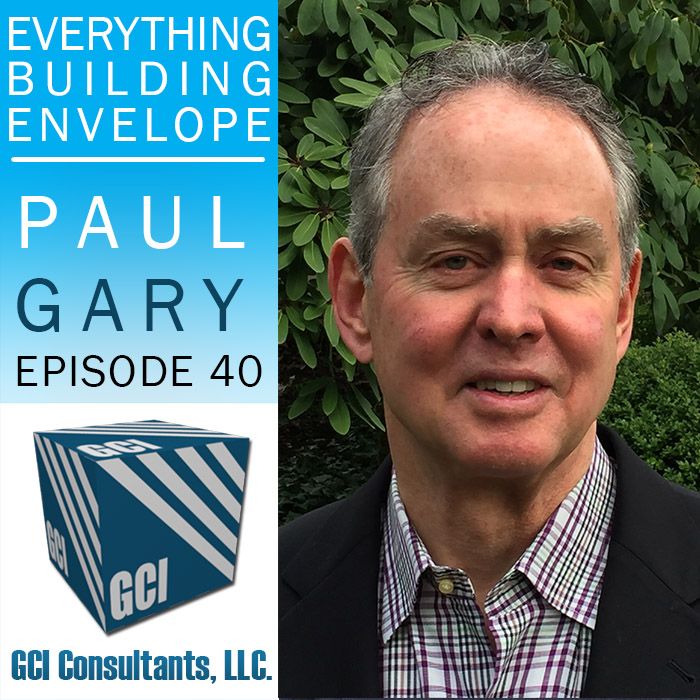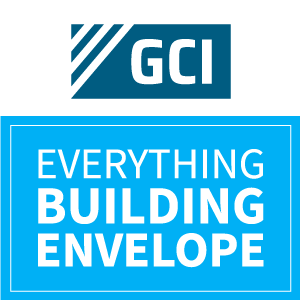
About The Everything Building Envelope Podcast: Everything Building Envelope℠ is a dedicated podcast and video forum for understanding the building envelope. Our podcast series discusses current trends and issues that contractors, developers and building owners have to deal with related to pre and post construction. Our series touches on various topics related to water infiltration, litigation and construction methods related to the building envelope.
https://www.everythingbuildingenvelope.com
*** Subscribe to the show and leave us a Review on ITunes!
Will: Hello, everyone, and welcome to today’s podcast. I’m Will Smith. I’m the president of GCI Consultants. I’m going to be your host today. I’m very happy that we have with us an old friend, Paul Gary of the Gary Law Group in Portland, Oregon.
Paul’s firm has an extensive history of providing legal services to the construction industry. So welcome, Paul.
Paul: Thank you, Will. Nice to hear from you. I’m happy to be here.
Will: Great. Can you give our listeners a little bit more information about yourself and your firm?
Paul: We are located out, as you mentioned, in Portland, Oregon. Really have for the past…well, let me put it this way. In 1992, I got involved with construction issues and working with window and door manufacturers, and have been doing that ever since in the last probably 10 years mostly with regard to representation of window and door manufacturers, but in the context of exterior cladding issues and construction defect issues.
Will: Great. And that fits right into what the topic is going to be today. I’ve asked Paul to talk with us today about what do we do when we get a notice of a defect related to a construction project? Now, in Florida, we’re kind of used to hearing about what we call a 558 Notice.
And I know that Paul’s firm has even been involved in some of these cases here in Florida, but I believe other states have provisions that are similar to a 558 Notice. Is that right, Paul?
Paul: That is right, Will. And yeah, we’ve had a number of these down in Florida. Nevada has chapter 40. California has what’s still called Senate Bill 800, and so it’s a phenomenon that emerged some years ago and is pretty prevalent now.
Will: And what is that notice? Is it really a lawsuit?
Paul: The notice is not a lawsuit. We actually wrote the Oregon notice and opportunity to cure statute. And bear with me for an anecdote, I remember being at a hearing in the State Capitol and representative from the industry that I was with said, “You know, the last time I was sued, I had…the first notice I had that there was any problem was entitled summons and complaint.”
And there’s something that’s just not right about that. And the way to tap the brakes, so to speak, and put a check on a situation like that is to have a statute which requires notice, an opportunity to inspect, and an opportunity to make an offer to perform or do some corrective work if it’s called for as a precondition to the right to file a lawsuit.
So that is what 558 is, chapter 40, Senate Bill 800, and Oregon chapter 701.
Will: Okay. Let’s say I’m a contractor or a material supplier, a manufacturer, whatever, let’s say I get one of these notices. What do I do now?
Paul: Will, that is a pretty open-ended question, and I’m happy to answer it. There are some things that you always want to do. And then as you gather information, you’ve got more specific choices to make. But perhaps to me, the first thing to do is get your own information.
You should have been given notice of project name or address, dates, parties’ names, and get your own information from the sources that are available as to what your involvement was at that project, and whether or not there have been any problems. If you have a product manufacturer, what product is involved? And products have strengths and weaknesses.
And begin to build your own context because the information that you receive from what I’ll call the other side, and a notice and opportunity to cure situation, is all filtered. It’s all tailored to make it look like you have a liability. So you have to get out there and do some work , to do your own investigation.
At least that’s step one to me.
Will: Okay. This notice of opportunity to cure is really…it’s telling me that I have the option to go out and fix something. Is that right?
Paul: That’s right. You have the right to request or demand an inspection in a lot of situations. Initially, a visual inspection. Get out, get on the ground and see what’s there, to be followed if need be with an invasive investigation as you very well know because we’ve done a bunch of them together.
Will: Yeah. Now, let’s say I’m a contractor and I get this notice or anybody involved in the construction process and I get this notice, you mentioned preparing yourself and documentation. What kind of documentation do I need to get? What should I get together?
Paul: I’d want to know what my product is, whether or not I have any contractual entanglements. In other words, do I have any contracts that apply to this project? Because those commitments form a background, whatever the contractual terms are, form a background to your notice and opportunity to cure.
They don’t go away. They’re still part of the situation. Find out whether or not there have been any complaints. And let’s say you’re a product manufacturing and you sell through distribution, contact your distributor. Find out if there have been any problems, any issues at this project or at similar projects involving the same parties. Because believe it or not, you often will get one of these and it’s not your product and it’s not your work.
It’s easy to send out one of these notices. It takes a little bit of diligence to make sure, first of all, am I really involved in this job? And secondly, then, have there been any signs of any problems? Because you’d like to know that before you get out there.
Will: What about product warranties and construction warranties? It’s pretty common in the construction industry that they offer like a one-year warranty or something like that. Are these warranties really important and how does the Notice of Claim, how does that affect all of this? What if it comes in after the warranty period expired?
Paul: Well, if a Notice of Claim comes in after the warranty period has expired, there are other legal theories that are normally available to a property owner who’s really got the primary responsibility to give the notice that’s part of this program. And if there’s a latent defect or if there is damage to other property, the law gives claimant an opportunity to bring tort claims which are different than contract or warrantied claims.
Is the warranty important? It’s absolutely important and I’d be happy to talk about that as we go along here.
Will: So if it’s let’s say a one-year warranty period and that one year has gone past and I get a notice, that doesn’t just mean that as a contractor, I’m off the hook because one year has gone by.
Paul: No, that would be a mistake to treat it that way.
Will: Yeah, okay. And talk a little bit more about these warranties. You said there’s other information you can give us about those.
Paul: Yeah. Well, this is a theory or an approach that we’ve developed. And candidly, it’s summed up by this simple comment. You can’t sue me for something I’m willing to do. You can’t sue me for something I’m willing to do.
So if you do have a warranty and let’s say the warranty is not expired and you offer to perform under the warranty, the lawyer who represents the party that issued the notice and is intending, this is really a precursor to litigation, is intending to sue you, they don’t want you to do the work. They want a check, they want money.
And by offering to do work, whether it’s in the chapter 40 context or the 558 context of notice and opportunity to cure, or simply under a product warranty, you are offering to do something. You’re tendering performance. And if the claimant won’t allow you to perform, that obligation may be excused.
We use it all the time. You can’t sue me if I’m willing to do the work that can exist in warranty or outside of warranty.
Will: It’s very interesting. Let’s talk a little bit…you mentioned earlier about making a demand or a request that you perform an inspection. So let’s say I get served this Notice of Claim , and how do I go about making this request to do an inspection?
And what am I going to be looking for? Let’s say the claim is, as you and I have seen many times and they often involve water leakage, how does the contractor know what to look for when they do this type of a property inspection?
Paul: Well, if the contractor is not confident, if it’s a significant project and the contractor is not confident that they understand their work well enough to be able to go out and look at critical areas around the work that they have done and observe the condition and get a pretty good sense of whether or not there’s a problem with what they did.
If they don’t feel like they can do that, they really need to get some expert assistance to help them because you get one visual inspection normally, and those eyes have to be trained to be able to identify, are there signs of problems?
Will: Do you find that these notices are kind of vague when they come in? It says they have a problem where…do they get specific about the problem or they just generally say we have leakage or something like that?
Paul: They’ll often say, “We have leakage,” and be terribly vague. And most 558 and most of these statutorily-driven schemes require specifics. And someone has to understand the basis on which, in our case are hypothetical, the 558 notice is given and look at the rules.
And if the person sending the notice didn’t follow the rules and didn’t provide the specifics, that’s your first response to them. You haven’t given me an adequate notice. I’m not recognizing this as an adequate notice. And whether it’s from a statutory scheme, Will, or a contract, always stop and look. If I’m not reasonably informed of what they believe the problem is, that in and of itself is a problem and you have to go back to the claimant with that.
Will: Okay. So now, and theoretical here, I’ve gotten a notice. I’ve responded to it. I did all my due diligence, got all my background information, got my documents in order. I went out there and did my inspection. Now, how do I respond to the 558 as a contractor or a material supplier?
Do I just shoot off a letter in my letter head or what do I got to do?
Paul: Yeah. The form of the communication is mostly by letter, but you really have to have a template of what are all the time deadlines and to make sure that you follow those. And then you have to get enough information so that you know whether or not to make an offer.
And normally, you can make an offer to do work or you can make an offer to write a check or pay money. And if that is accepted, then the claim against you, assume you go ahead and do the work, at least the claim against you pursuant to that notice is satisfied.
Will: So it sounds to me that no matter what, if I’m a contractor, a builder, a material supplier, and I get one of these notices, my best defense is to get legal counsel involved.
Paul: Yes. Unless it’s such a small item that you believe it’s not worth it or you’ve had an awful lot of experience in doing this yourself, you really do need to have some guidance. You spend a few bucks up front, pays off in the long run.
Will: All right, well, I think what you’ve given us here is excellent information. I really appreciate your time today with us, Paul. It’s been very helpful and I know our listeners gain a lot of insight and advice on handling these types of notices. But before we go, what’s the best way to contact you or your firm?
Paul: Oh, thanks, Will. Our website is prgarylaw.com. My email is paul@prgarylaw.com. And God rest her soul, I used to explain to my mom that I name everything after myself so that she thinks I’m successful.
Will: Good move. Excellent. All right. Then, Paul, thank you so much. Again, I hope everyone enjoyed our podcast today. We really look forward to bringing you other interesting topics and guests as we continue our discussion about matters affecting the building envelope. Again, thanks to Paul, thank you to our listeners.
I look forward to talking to everyone soon, once again, on the Everything Building Envelope podcast series. And if you want any more information, you can also contact GCI at www.gciconsultants.com, or you can see the entire series of podcasts at www.everythingbuildingenvelope.com. So thank you for now. This is Will Smith signing off today’s broadcast.
Thank you.


